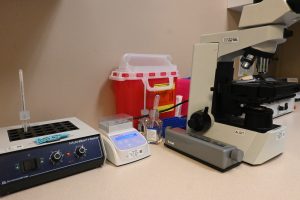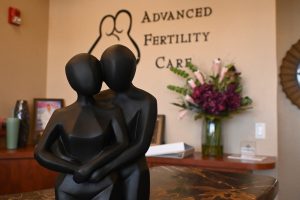EDS: An earlier version of this story incorrectly incorrectly quoted E-Beth Marshall in the 20th graf. The story below has been corrected, but clients who used previous versions are asked to run the correction found here.
- Slug: BC-CNS-Arizona IVF. 1,785 words.
- Photos available (thumbnails, captions below).
By Lauren De Young
Cronkite News
PHOENIX – It was Christmas Day 2012 when E-Beth Marshall and her husband’s lives were shattered.
“We finally got to go and tell everybody that we are pregnant, and then on Christmas Day, we ended up miscarrying,” Marshall said. “It was heartbreaking.”
Over 11 years, Marshall had seven miscarriages. She tried everything from natural pregnancy to intrauterine insemination to embryo transfers. She turned to in vitro fertilization and still ended up miscarrying.
“Mine’s the story that everyone hopes they don’t have,” Marshall said.
One support system she had was religion, but after rounds and rounds of reproductive treatments, Marshall and her husband struggled with their relationship with the Catholic Church, which calls IVF “immoral.”
So, Marshall turned to faith, not the church.
“My mother-in-law … a Catholic, said to us, ‘You have to do what you need to do for you and for where you feel God is calling you, and it’s not for the church to tell you yes or no,’” she said. “That was really helpful for us.”
Religious objections center on morality
Reproductive technologies have increasingly been scrutinized by religious leaders. In June, the Southern Baptist Convention made headlines when it voted to oppose the use of IVF, citing the excess of embryos made, stored and sometimes experimented on through the process.
“It’s not that technology is bad, and there are technologies out there that are safe and that do uphold the dignity and sanctity of human life,” said Anthony Cox, lead pastor of Mercy Hill Church and Arizona trustee on the Ethics and Religious Liberty Commission of the Southern Baptist Convention. “Southern Baptists want to affirm the dignity and value of every human life, no matter what stage of development, no matter the location, whether that’s in the womb or outside of the womb.”
Cox said the purpose of the Southern Baptists’ resolution was to slow down and think of the moral and ethical implications of IVF and other reproductive technologies.
“What Southern Baptists are saying is just because we can do something doesn’t mean we want to or should do something,” he said. “Let’s just simply slow down and think about the ethical implications. Where’s this taking them? Where does this take us from an ethical standpoint of how we view human life?”
During IVF, mature eggs are harvested and fertilized outside the uterus, creating multiple embryos and opportunities for a viable egg to be implanted. This often results in excess embryos being created and frozen or discarded, causing apprehension from religious leaders.
“What’s really problematic is the idea that … ultimately most of them will be destroyed,” Cox said. “That carries with it ethical implications that we need to lean into wrestling.”
Estimates about the number of frozen embryos in the United States vary widely with some putting the number around 600,000 and others approximating around 1.5 million.
Genetic testing and manipulation are other concerns for religious leaders. The Southern Baptists’ resolution regarding IVF states that technologies “dehumanize” embryos through genetic sorting and determining suitability for life based on genetic fitness and parental preferences. Cox called it a “commodification of life.”
“The fact that there can be genetic testing, that there’s selecting based on the quality of embryos that one would be chosen over another” is concerning, Cox said. “And so from that standpoint, you ask yourself, where could that lead to? What decisions can be made?”
But, Marshall, who is the executive director of Advanced Fertility Care, an Arizona-based fertility clinic, emphasized that these decisions are personal.
“Too many embryos … created or genetic testing … those are all choices you can make in your treatment plan with your doctor,” she said. “The biggest key is those decisions should be between you and your doctor.”
Marshall opted not to do embryo genetic testing, calling it her and her family’s “line in the sand.”
“We opted not to do PGT testing (pre-implantation genetic testing) because it was just something that we just thought wasn’t necessary,” Marshall said. “But other people, they might have a genetic disease, and so they want to know, and so they are going to get their embryos tested. That’s their personal decision, and that’s a decision they should make with their doctor.”
Wrestling with faith
Though the Southern Baptists’ resolution and other religious opinions carry no legal weight, it can be disheartening for church attendees.
“It’s hard, especially if you’re grappling with what your church aligns you with versus what you know the necessary treatment is,” Marshall said. “For me, I just feel like it doesn’t impact my relationship with God.”
Marshall’s journey with infertility led her and her husband to quit going to church for a while.
“Going to church became hurtful for us,” Marshall said. “There was always new pregnancies, there was always baptisms, and our journey was very long.”
“It is tough when you feel like your religion isn’t there to support you and that they don’t understand what you’re going through,” she continued.
Over 40% of Americans have received or know someone who has received fertility treatments, according to a 2023 Pew Research Center survey. These reproductive technologies, including IVF, have been a lifeline for those struggling with infertility.
“They might have endometriosis, they might have PCOS (polycystic ovary syndrome), they might just have some hormonal imbalances, or they might have diminished ovarian reserve … and that’s not something that they can control and that they need treatment for,” Marshall said.
Marshall emphasized infertility is a medical condition.
“They shouldn’t feel shame in that, and they can still believe in God, and they can still live that life, but knowing that they’re getting medical treatment for the fact that they’re not able to get pregnant, that’s the best thing,” she said.
Even though the Southern Baptist Convention objected to IVF, each individual church is autonomous.
“There’s freedom to disagree on matters like this, especially when it gets to the nuances for everybody,” said Cox, the Mercy Hill Church lead pastor. “There’s gonna be differences of opinion all across the board.”
Cox stressed the importance of coming together as a God-led community to support those struggling with infertility, regardless of views on IVF.
“We want to meet them with compassion, empathy, and be able to stand with them in solidarity,” he said. “We just simply want to come alongside and show what the Scriptures teach.”
The legal landscape in Arizona
In February, the Alabama Supreme Court ruled that an embryo created through IVF should legally be considered a human life and destruction of such embryos can be prosecuted. The ruling sent shockwaves through the state and resulted in many clinics pausing IVF treatments for patients.
The ruling caused a ripple effect across the U.S., including Arizona. Concern regarding the legality of IVF frightened both patients and providers.
“When Alabama happened, we had patients move embryos from our clinic to California or to Colorado, to blue states, because they are concerned about (the) right wing making decisions on embryos,” Marshall said.
The Alabama ruling and subsequent attacks on IVF access came as a surprise to Marshall.
“I never thought I would see a day where IVF would stop, and especially in the year 2024, and that’s exactly what happened in Alabama,” she said.
Following the court decision, Alabama’s Legislature quickly passed a bill providing civil and criminal immunity to clinics utilizing IVF, which the Republican governor signed.
In March, Arizona Attorney General Kris Mayes assured Arizonans that IVF is legal and vowed to protect access in the state.
In 2021, assisted reproductive technologies were involved in 1,319 births in Arizona (1.7%), according to the Centers for Disease Control and Prevention.
Dr. Frederick Larsen, a physician who works with Marshall at Advanced Fertility Care, is confident that due to the popularity of IVF and reproductive technologies, treatments will remain accessible.
“I don’t think that the public at large has any interest in limiting people’s fertility treatment options,” he said. “There are too many people who know other people who have used IVF to build their family and see it as nothing but a positive.”
The plaintiff in the Alabama case claimed that hospitals and fertility clinics should be held liable for the destruction of embryos. When the court sided with the plaintiff, it effectively established embryonic personhood, extending the rights of a minor to an embryo.
Attempts to legislatively establish embryonic or fetal personhood in Arizona have failed. In 2023, Rep. Matt Gress, R-Phoenix, introduced five bills that critics called a “sneaky” attempt to establish fetal personhood, according to the Arizona Mirror.
Embryonic or fetal personhood as law could open the door for IVF critics to claim embryos are protected as people and the destruction of embryos may be prosecuted.
Nationally, both parties have introduced bills to protect access to IVF in different ways, but they have been blocked. Reproductive rights, including abortion and IVF access, are hot button topics for the 2024 election, and Marshall urged Arizonans to pay attention.
“We’re basically making it a political issue,” she said. “We just have to be diligent to make sure that, especially in Arizona, that we don’t have bills being introduced (limiting) … access to treatment.”
Larsen emphasized that public input is essential and called restricting IVF access a “losing issue.”
“There simply is no outcry from the public to change things,” he said. “In fact, there would be an outcry from the public if a court decision or legislature did try to limit fertility treatments.
“Just look at how quickly the Alabama state Legislature got a bill passed that was immediately signed by the governor to protect IVF treatments, patients and physicians after their Supreme Court came down with a decision that did look like it would cause problems with fertility treatments,” Larsen continued.
But, interpretations of the Christian Scriptures dictate that life begins at conception, catalyzing some religious opposition to IVF.
“We essentially affirm that human beings have inherent right to life and they should have the opportunity to reach their full development maturity,” Cox said. “And that’s rooted in the
Scriptures, which guides what we believe and how we think about human life.”
Marshall argued that criminalizing IVF and the cryofreezing of embryos would strip away some of the hope that such reproductive technologies provides.
“Just because an embryo is created in a petri dish does not mean it’s guaranteed life,” she said. “It doesn’t mean that embryo is going to continue to grow and to develop. It means, at that moment, it’s reached day five, and it’s a fertilized egg.”
“It’s a chance, it’s a hope,” Marshall continued. “It’s everything that any patient wishes for that they have a viable embryo to try. But there is no guarantee that is life.”
For more stories from Cronkite News, visit cronkitenews.azpbs.org.

